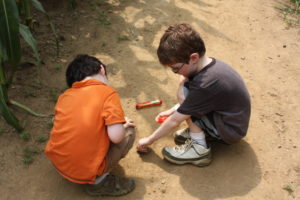I asked a friend the other day how her writing was going.
“I’m thinking about writing,” she replied. “Does thinking count for anything?”
Ouch. Sound familiar?
So, you know what I’m going to say, right?
Thinking…well, actually thinking DOES kind of count as writing. (There, did I surprise you? Wait for it…)
But only if you’re doing it in the right way.
(Oo, you knew there was a catch!)
Thinking Kinda Does Count…And It Really Doesn’t
- Writers need to think — We need copious amounts of thinking time. We need to daydream and imagine and ‘what if’. Happily, we can do this while attending to all those routine brain-free tasks we have to do every day: you know, the ones that keep us clothed and fed and sanitary. (If you’re an adult you know what I mean. If you’re a kid…no, if you’re a kid you won’t even be reading this. You’ll just be writing your first best-seller. Move along.)
- Beating ourselves up is not productive — unfortunately a lot of writers (especially the ones who aren’t doing any writing) spend a lot of their thinking time fretting about how they’re not writing, not good enough, a lousy person for not doing more actual writing. This is not only unproductive, it is destructive. The best way to stop this kind of thinking in its tracks is to write something — anything. (Keep reading for ideas on what you can write on a day like this)
- Capturing ideas is useful — sometimes ‘not writing’ means you’re out living. This is a wonderful thing for a writer. You need experience to be able to write anything meaningful. You need to come home and process the stuff that happened to you today, so that it’s there in your brain ready for when you need it. We need to hate people and imagine all the things we should have said to them. We need to love people and freak out when our imaginations show us what life would be like without them. We need to wonder what it would really be like if our plane crashed on a desert island: how would we wash our clothes and what plant fibers could be spun into thread to repair them?
- Thought vs. creativity — There will come a time when you need to look at your work with a critical eye, but that time is not during the initial writing phase. In fact, the less you think while you’re writing your first draft the better. Turn off that brain, move your hands and just let the words pour out.
It’s all very well for me to sit here saying this. But how do you actually move from thinking to writing?
You Must Take Action
You have to actually carve out time to sit down and write. Even if you can’t finish a whole chapter. Even if all you can manage is 100 words, 55 words, 140 characters,
DOING something (i.e. writing, crafting a story and characters) is so much better than thinking. Always.
(You may not feel great while you’re doing it, but trust me, afterwards? You’ll feel awesome.)
How To Take Action With Your Writing
It’s easy to get overwhelmed and beat yourself up because you haven’t finished your first novel yet.
Screw that.
- Set yourself a tiny goal and meet it. Write a twitter fiction story. Write a 55-word story. Write exactly 100 words (no more, no less). Set a deadline. Do the work. Now tell me that didn’t feel good.
- Use prompts — I know it can seem corny but grab a writing prompt and use it for your own purposes. I assigned everyone on my writing course the same prompt one day and you would have been amazed at the radically different stories that came back from 12 different people.
- Embrace the first draft — Give yourself permission to write something truly dreadful. Tell yourself no-one is going to see it. Picture a baby learning to walk: they fall down, they get up again, they fall down, they get up again, and eventually they are up more than they are down. We learn by doing. We learn by making mistakes. Write something terrible, don’t show it to anyone. Remind yourself the goal is to write something, not to write something good. Not yet.
- Get an accountability buddy — life comes at us fast. If you’re like me, there’s nobody knocking down your door to hand you a living wage for your fiction yet. It’s easy to let writing slip into the background and — whoosh! — a month has gone by without a single word written. By finding someone to keep you honest, you give yourself the kind of deadlines that you need. You don’t even have to swap writing samples. Just make sure you find someone who will stay on your case and not be too nice to you!
- So yes, think. Think about your writing. Think about your characters. Think about what you’ll do when you’ve reached your goals.But most of all, keep writing.
What one thing will you commit to writing this week? How will you make it happen?
Leave your commitment below, & I will be your accountability buddy for this week (I will personally check up on you on Wed June 22!)





